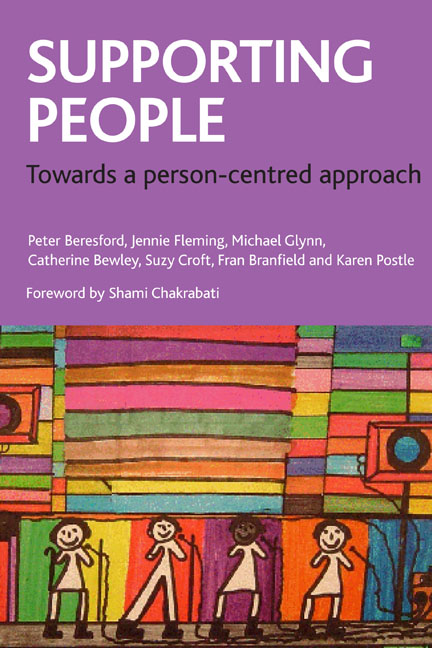Book contents
- Frontmatter
- Dedication
- Contents
- About the authors
- Acknowledgements
- Foreword
- Introduction
- Part One The Background to Person-Centred Support
- Part Two Person-Centred Support: Barriers and Ways of Overcoming Them
- Part Three Broader Issues for Person-Centred Support
- Part Four Making Change to Achieve Person-Centred Support
- Appendices
five - Social care and carers
Published online by Cambridge University Press: 01 September 2022
- Frontmatter
- Dedication
- Contents
- About the authors
- Acknowledgements
- Foreword
- Introduction
- Part One The Background to Person-Centred Support
- Part Two Person-Centred Support: Barriers and Ways of Overcoming Them
- Part Three Broader Issues for Person-Centred Support
- Part Four Making Change to Achieve Person-Centred Support
- Appendices
Summary
Of adults with a learning disability living in the community, 52 per cent live with their parents and 12 per cent with other relatives.
(Disability Rights Commission, 2007, p 34)Standard Five: Carers
Policy and practice based on person-centred support should ensure appropriate support to service users, their families and friends, instead of placing increasing reliance on family and friends to act as ‘informal carers’. Services should support individuals to exercise choice and control while respecting the values of love and mutuality in relationships.
Introduction
In this chapter we focus on the unpaid support which service users receive from those close to them – ‘informal carers’ as they have come to be called. Such unpaid ‘caring’ is a complex and highly contentious issue. Over the last 30 plus years, governments and policymakers have placed an increasing stress and reliance on such support. They have emphasised that most of the support that service users receive comes from such informal carers, rather than the paid workforce examined in the last chapter. We are regularly told that ‘There are almost six million unpaid carers of adults in the UK…. Without them, the social care system would collapse’ (Hampshire County Council, 2008, p 65). Here we look at how such arrangements work out in practice, their implications for person-centred support and to what extent they may be consistent with service users’ choice and control over their lives.
The term ‘carers’ or ‘informal carers’ has come to be used particularly in relation to support provided for people by their family, friends and neighbours. Most often, it means support provided by people's families and loved ones. Such ‘caring’ can embrace a very wide range of activities and relationships. It may mean providing support to a sibling, partner or offspring. The need can arise at any time in our lives – from when we are still at school, to our own old age. It may entail some modest help with routine day-to-day tasks like shopping or cleaning, to help with the most intimate activities of daily living ‘twenty four seven’, as some carers put it. The need may arise because of someone's physical, sensory or intellectual impairment, through mental distress, chronic illness or increased physical and mental frailty linked with older age.
- Type
- Chapter
- Information
- Supporting PeopleTowards a Person-Centred Approach, pp. 127 - 150Publisher: Bristol University PressPrint publication year: 2011



